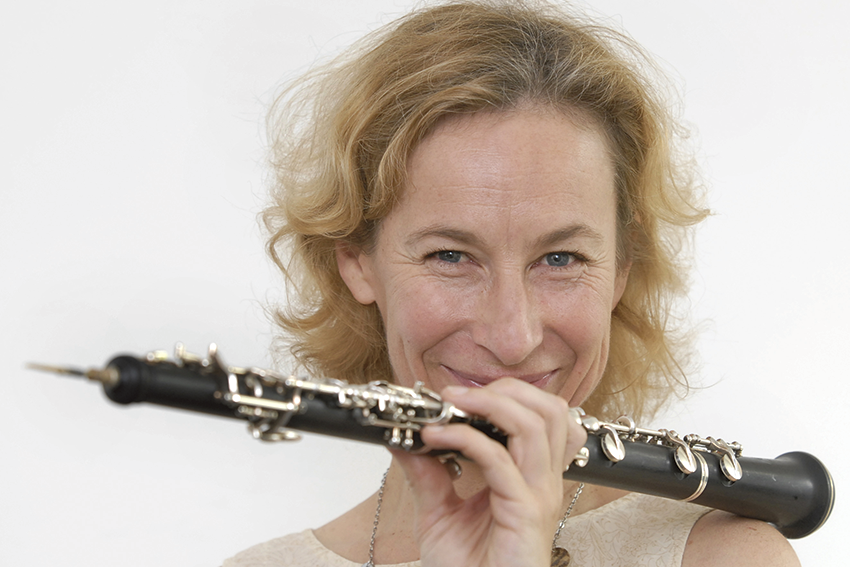Adelaide Symphony Gala: Discoursing with guitar

With Cathy Milliken as its composer in association, the Adelaide Symphony Orchestra (ASO) has made a significant move forward in its approach to commissioning.
One area which the ASO works quietly and assiduously away at is in commissioning new music. It is only when a completely unfamiliar piece pops up in a program that one might become aware of this, and it is sure to happen in the upcoming Guitar Festival’s gala
concert. In among staples by Rodrigo and de Falla will be a new work by Catherine Milliken for classical guitar, voice and orchestra, entitled DACCORD.
It will not be the first time, though, that we have heard music by this Berlin-based, Brisbane-born composer. In 2016, her Earth Plays made a strong impression at Ilan Volkov’s Tectonics in that year’s Adelaide Festival. Scored for mezzo-soprano and orchestra, it was an evocative and highly original set of four sound pictures that described the ‘acoustic imprints’ that people leave through their ritualistic practices and memories. Earth Plays went on to win Orchestral Work of the Year at the 2016 Art Music Awards.
“It was the first time I had heard Cathy’s music,” says Simon Lord, the ASO’s director of artistic planning. “Afterwards the players all remarked, ‘Wow, this is a composer of phenomenal imagination’.”
Milliken’s new piece DACCORD comes on the back of that success and is the first in a triptych of works she is planning to compose in her role as the ASO’s inaugural composer in association. Two more works will come, in next year’s Master Series and in 2020.
“The idea is that develops a continuity with the orchestra so that she gets to know the musicians and their sound,” Lord says. “So hopefully she will respond to that.”
He has seen the score of DACCORD and says that the soundworld Milliken has created “looks absolutely fascinating”.
Milliken describes the work, which she has subtitled ‘A diary of discourse’, as corresponding in conception to a concerto.

“When Simon suggested I connect in with the Guitar Festival, I had not thought of this,” she says from Stuttgart. “There can be balance problems between guitar and orchestra which are a challenge, but I became interested in the possibilities of combining the intimacy of guitar with solo voice and the extra power of the orchestra.
“I very quickly decided on the idea of negotiation. I started looking up negotiation – what it means and what it involves – and the more I thought about it, it was not new to me at all. Each side, guitar and voice, lays out their particular ideas, input and reflections through dialogue and within the surrounding orchestra.”
The word ‘accord’ also signifies chords, and Milliken says there will be reference to this layer of meaning in how she crafts the string sections.
Asked what people might particularly listen out for in DACCORD, the composer replies: “I would be very happy if the audience hears the resonance of the guitar and the notion of discussion, where ideas get picked up and then thrown around.”
Milliken says she was ecstatic when the ASO approached her last year to take up its newly created role of composer in association.
“The email that came was like a letter from heaven and made me feel like jumping three times in the air when no-one is looking. In my three years with the orchestra I will be able to experiment and try out ideas intimately with the orchestra.”
Milliken’s highly varied output to date, encompassing chamber music of very different combinations to operas, radio plays and sound installations, makes her one of Australia’s most interesting composers to watch.
Her participatory opera ‘GAACH – a sort of Folk opera’ at the 2016 Munich Biennale collected up some 200 people from nearby institutions including a local community college, refugee centre, youth orchestra and the Munich Philharmonic Orchestra.
Until recently, Milliken served for many years as director of the illustrious Berliner Philharmonic’s education program, earning special praise from Simon Rattle for “her ideas and enthusiasm” during his tenure as conductor.
This other prong to her career will see her involved in various outreach activities while composer in association at the ASO, including with Gabriella Smart’s Soundstream Collective and in composition workshops with Elder Conservatorium students.
Lord believes it is vital that orchestras have composers at the core of their artistic activities in order to create an ongoing legacy of orchestral music.
“The idea of composer in association happens with many orchestras, so it is not new,” he says. “How it happened with Cathy is that we wanted to build a body of new works for orchestra.
“Cathy is one of many composers of her generation whose music needs to be performed and heard. In terms of the ecology of music in Australia, it is absolutely important that we do this.
We will absolutely continue doing this beyond Cathy.”
To engage a composer to work with the ASO for a three-year period marks a significant move forward in the orchestra’s approach to commissioning. The ASO has consistently aimed at producing two new commissions each year, and up until now these have been one-off projects. However, the longer-term relationship allows the composer to progress their ideas much further.
We can look forward to the fruits of this with Milliken, starting just around the corner with the Adelaide Guitar Festival. At the same time we might note the substantial catalogue of works the ASO’s commissioning process has given us in recent years. They include Hollis Taylor’s recorder concerto Absolute Bird, in which Genevieve Lacey performed as soloist last year, Andrew Ford’s Raga at the 2016 Guitar Festival, Iain Grandage’s Anzac Requiem Towards First Light in 2015, and Natalie Williams’s Our Don tribute to Sir Donald Bradman in 2014.
Guitar Symphony Gala
Festival Theatre
Friday, August 10
aso.com.au
adelaideguitarfestival.com.au